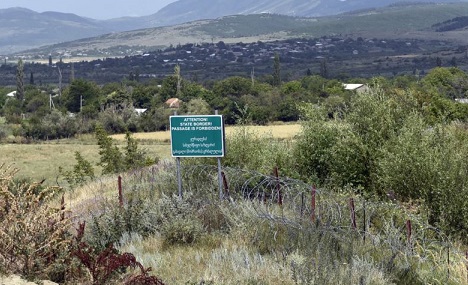Prohibition of public transport movement created problems for the residents of the villages alongside the occupation line
March 27, 2020

Lado Bitchashvili, Shida Kartli
The villages alongside the occupation line have been closed for the representatives of the media and nongovernmental organizations for the past few months. The Ministry of Internal Affairs made the decision after the Russian occupation forces started “borderization” nearby the Chorchana village alongside the occupation line. The MIA established restrictions not only in direction of Chorchana village but in direction to almost all villages in Shida Kartli region located nearby the occupation line.
At that time, the MIA did not restrict movement for the residents of these villages. However, after the state of emergency was announced in the country for the prevention of the spread of the COVID-19 and the public transportation was prohibited in the country, the inhabitants of the villages alongside the occupation line were left in isolation.
Nunu Kapanadze from Bershueti village in Gori municipality said prohibition of the public transport movement created problems for their villages. She said the families, who do not have cars, are in particularly difficult situation.
“It would be good, if they send at least one bus, which would serve several villages in Bershueti community. We do not request anything else. We have some needs, and it depends on the movement of public transport. We need to travel to Gori to get pension, to buy medicines, etc. I know that the transport movement was prohibited for the prevention of the spread of the virus but I think it is possible to send only one bus, at least twice a week, and control the number of passengers on it to prevent the spread of the virus. It will be huge relief for the locals,” Nunu Kapanadze from Bershueti village said.
The price on some products has raised in the village shops; however the shops still have enough products to sell. The locals have already started spring agricultural works. When the country fights with the deadly virus, the locals avoid to bother the government with their local problems.
Like in Bershueti, the residents of Adzvi village in Gori municipality also complain about the prohibition of the public transport. They try to follow the recommendations of doctors very carefully and avoid public places.
“The agricultural activities have already started in the village; people still have storage from the previous harvest and we can still cope with the situation. You might have heard that village is strong; farmers will not be left without food. Some of us have cows, others hens and we will manage to keep our families. Only transportation problem worries us like all others in Georgia,” a resident of Adzvi village said.
The representatives of the local government cannot say when the transport movement will restore. Gori municipality mayor Konstantine Tavzarashvili said the decision was made by the Government of Georgia and the local authority cannot restore it without the permission of the central authority.
“The movement of the public transportation was prohibited in the entire territory of Georgia based on the Prime Minister’s order. Until the government makes the new decision, the local authority cannot promise anything to the population. Movement of the public transport was prohibited for the sake of the health of each citizen,” the municipality mayor clarified.
As the residents of the villages alongside the occupation line clarified, after the new cases of the COVID-19 were confirmed in Georgia, the representatives of the occupation regime stopped so-called “borderization” process and no cases of kidnapping of locals were observed either.
News
December 13, 2023
Ethnic minorities outside the peace dialogue
November 6, 2023
‘Peace’ agenda of political parties
Popular
Articles
February 13, 2024



